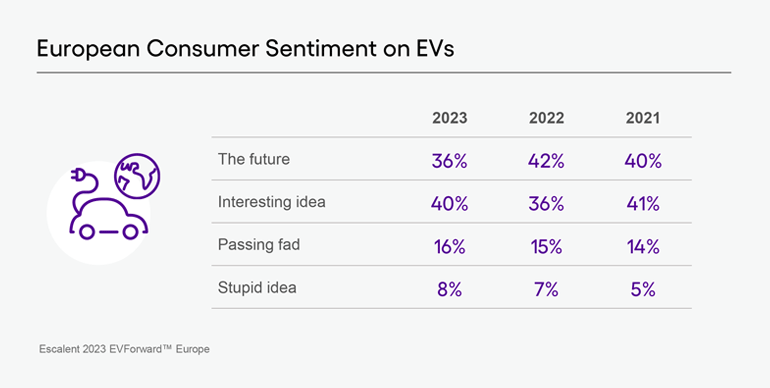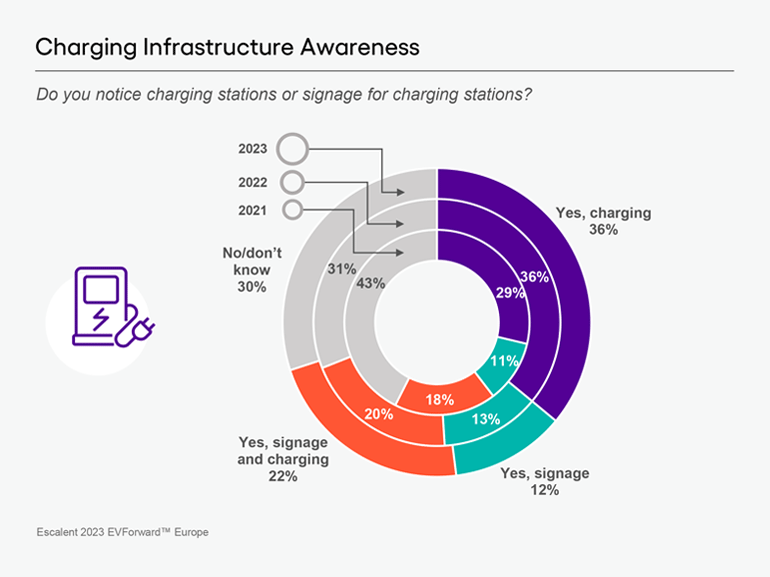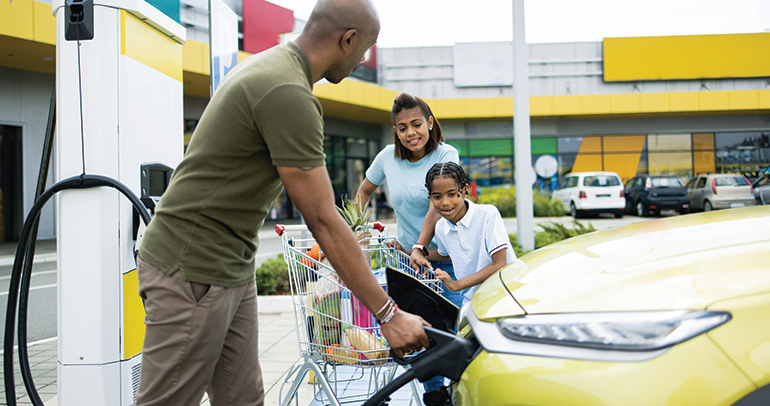
As electric vehicle (EV) penetration in Europe stands on the cusp of migration from the Innovators and Early Adopters to the more volume-significant Early Majority, it is vital that EVs project a confident momentum that points towards increasing market maturity rather than presenting a decline in interest and adoption.
However, that is not what we have uncovered in the findings from our 2023 EVForward™ Europe study that surveys 10,000 new-car buyers in France, Germany, Italy, Spain and the UK each year since we launched the research program in 2021. Surprisingly, consumer enthusiasm and confidence in EVs have plateaued rather than continue the positive momentum we saw between 2021 and 2022.
As part of EVForward Europe, we identified six unique European EV buyer personas and their likelihood to adopt EVs. Two personas that have led EV adoption to date entered the EV market due to hard convictions: the Pillar persona recognised the environmental benefits of EVs to society while the Pioneer was excited by the latest technology.
The third persona in line is the Influencer—a group more likely to enter the EV market when it is safely cool to be seen as an adopter, effectively wearing a fashionable set of new clothes or driving a tech-forward EV that projects to the peer group a trendy, progressive person. However, choosing when to make a fashion statement can be transient and subjective and will not take place if there are doubts.
What Happened to European Consumers’ Positive EV Sentiment?
In 2023 fewer new-car buyers regard EVs as “the future.” The slip to “interesting idea” from 36% in 2022 to 40% in 2023 suggests that, in recent times, consumers have not seen some of the anticipated EV maturity momentum. Instead of increasing confidence in EVs, the lack of progress in EVs being perceived as the future means EVs have not shed their “work-in-progress” status in the minds of consumers.

While large majorities of the Pillar and Pioneer persona groups continue to view EVs as “the future,” only 21% of Influencers are similarly confident—a decrease of three percentage points from 2022. Consequently, only 8% of Influencers intend to buy an EV as their next car whereas similar, much larger shares think that plug-in hybrids are a better option or will wait for the EV that feels right for them.
Although most see home charging as their main option, everyone needs a plan B up their sleeve—the ability to rely at least occasionally on public charging infrastructure. Reassurance about being able to rely on public charging comes, in part, from seeing charging options. In 2023, the level of increased recognition of charging infrastructure has not achieved the same level of improvement seen between 2021 and 2022.

Even among current EV owners there are some doubts about the viability of EVs as a proposition. Among those who found the EV ownership experience better than expected, nearly 25% state they would not buy an EV next time.
All these factors combine to create a sense that the maturation momentum of the overall EV proposition is running behind. In order to extend that momentum, the whole EV concept needs a timely “fast charge.”
Improving the Value Proposition of EVs
Increasing EV charging infrastructure is both complicated and costly and not directly under the control of automotive manufacturers. What is under the control of automakers is developing a deep understanding of the user experience and effectively positioning EVs.
Although most new-car buyers recognise the environmental benefits of EVs, these factors are not necessarily motivating when it comes to the purchase process. There is a need to rotate the EV proposition so that potential buyers can recognise other characteristics that can influence purchase.
EVForward Europe 2023 results also indicate that EV buyers would benefit from more support than they currently receive from their EV brands. Gone are the days when a car purchase was a one-off transaction every few years at best—there is now a great opportunity for brands to play the role of trusted advisor throughout the EV ownership experience. By combining trusted techniques with new communications technology and over-the-air vehicle software updates, automakers can facilitate a richer, more meaningful relationship with their customers that can be mutually beneficial throughout the EV ownership tenure. Furthermore, the more EV owners who have positive ownership experiences, the more they will endorse EVs among their peers, which will positively influence non-EV owners to consider EVs.
If you would like to learn more about our findings or how we can help you refine your EV strategy to gain market momentum, click the button below to connect with us.
About EVForward™ Europe
The EVForward Europe study was conducted across five European countries: France (n=1,968), Germany (n=1,999), Italy (n=2,052), Spain (n=2,048) and the United Kingdom (n=2,115). It was a market-representative sample of 10,182 respondents and included a survey that fielded between June 30 and July 31, 2023. These respondents are aged 18 to 80 with a primary vehicle model 2017 or newer and are planning to purchase a new vehicle within the next five years. Data were weighted by age and gender to match the demographics of the new-vehicle buyer population and by vehicle segment to match current vehicle sales. The sample for this research comes from an opt-in, online panel. As such, any reported margins of error or significance tests are estimated and rely on the same statistical assumptions as data collected from a random probability sample. Escalent will supply the exact wording of any survey question upon request.








